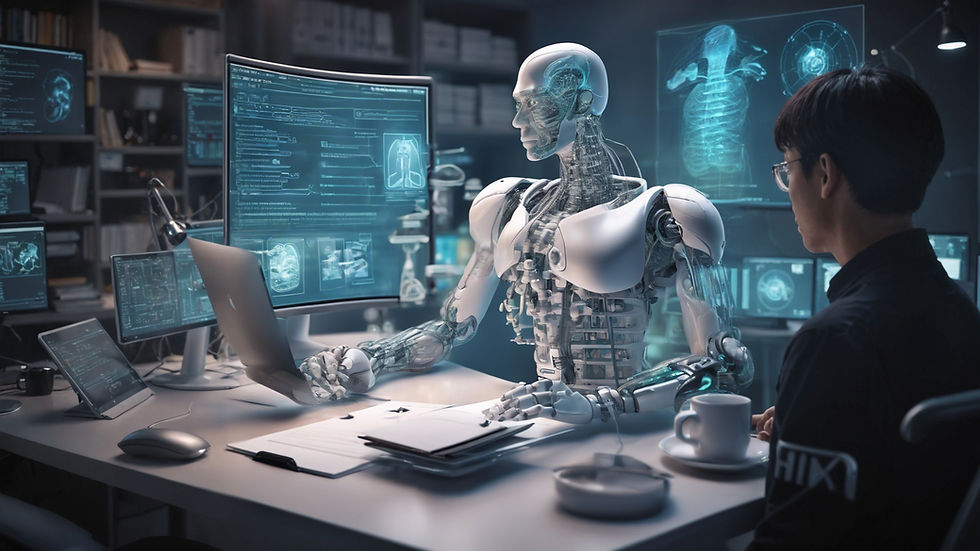Unveiling the Unseen: How Artificial Intelligence Is Revolutionizing Healthcare
- Feb 10, 2025
- 6 min read
Updated: Nov 2, 2025

Artificial Intelligence (AI) is transforming many fields, and healthcare is one of the most impacted. By using machine learning, natural language processing, and other AI technologies, healthcare professionals can improve patient outcomes, streamline operations, and offer more tailored care. This article examines the diverse effects of AI on healthcare, focusing on its advantages, challenges, and future possibilities.
The Evolution of AI in Healthcare

Artificial intelligence (AI) has been in existence for several decades, with its origins dating back to the mid-20th century. However, its transformative application in healthcare has significantly accelerated in recent years. Initially, AI applications were limited to basic tasks requiring minimal cognitive processing. As technology has progressed, so have the capabilities of AI systems. Today, advanced algorithms and machine learning models can analyze vast amounts of complex data, uncovering intricate patterns and correlations that may be overlooked by human practitioners. This capability has opened new avenues in understanding health trends, treatment outcomes, and patient behaviors.
AI's initial role in healthcare was to streamline administrative tasks like appointment scheduling and billing, reducing the burden on providers. Over time, AI's focus shifted to direct patient interactions, diagnostics, and treatment recommendations. Notably, AI in appointment scheduling has led to a 30% reduction in booking errors, enhancing efficiency and patient experience by minimizing wait times and optimizing resources.
Moreover, AI technologies are increasingly being utilized in diagnostic imaging, assisting radiologists by accurately identifying anomalies in X-rays, MRIs, and CT scans. These systems can analyze thousands of images in a fraction of the time required by humans, thereby expediting the diagnostic process and enabling earlier interventions. Additionally, AI-driven predictive analytics are employed to assess patient risk factors and forecast potential health issues, allowing for proactive management of chronic conditions. The potential of AI to assist in personalized medicine is also becoming evident, as algorithms can analyze genetic information and treatment responses to recommend tailored therapies for individual patients.
The potential of artificial intelligence in healthcare is considerable, with the capability to transform patient care significantly. However, it also presents important ethical challenges. Given the sensitive nature of health information, privacy and data security are paramount. The collection and analysis of patient data necessitate strong protections against breaches and unauthorized access. Furthermore, ethical concerns emerge in AI-driven decision-making, as algorithms may introduce biases in treatment or create disparities in care. As AI technologies become integrated into healthcare, it is crucial to establish clear ethical guidelines and regulatory frameworks to harness AI's benefits while protecting patient rights and maintaining trust in the system.
Enhancing Diagnostics with AI

AI is making a significant impact in diagnostics. AI-powered systems can evaluate medical images like X-rays or MRIs more quickly and often more accurately than human radiologists. A study found that AI systems detected breast cancer from mammograms with a 94% accuracy rate, compared to 88% for human radiologists. This reduced error rate can lead to earlier diagnoses, which is crucial for conditions like cancer.
By enhancing diagnostic accuracy, AI enables earlier intervention, which can be life-saving. For example, early detection of lung cancer, notoriously challenging to diagnose in its initial stages, can lead to a five-year survival rate of 56%. In stark contrast, when lung cancer is identified at later stages, the survival rate drops to a mere 5%. This stark disparity underscores the critical importance of early detection and intervention, where AI plays a pivotal role. The capability of AI systems to analyze extensive data and identify patterns that may elude even the most experienced radiologists can lead to quicker decisions regarding patient care, ensuring individuals receive necessary treatment at the right time. Furthermore, as AI technology continues to evolve and improve, its integration into clinical workflows promises not only to enhance diagnostic accuracy but also to alleviate some of the burdens faced by healthcare professionals, ultimately leading to a more efficient and effective healthcare system.
Personalized Treatment Plans

AI plays a pivotal role in personalizing treatment plans, heralding a transformative change in modern medicine. By utilizing extensive data, AI systems meticulously assess a patient's complete medical history, genetic information, and lifestyle factors, allowing healthcare professionals to develop treatment strategies tailored to each individual. This level of personalization is particularly vital in complex conditions such as cancer, where treatment efficacy can significantly differ between patients. For example, AI algorithms can effectively analyze genomic data to identify specific mutations and biomarkers linked to a patient's cancer type. Based on this analysis, AI can recommend the most effective chemotherapy drugs or targeted therapies that align with the patient’s unique genetic profile, thus enhancing the likelihood of successful treatment outcomes.
Studies show that tailored treatment plans can improve recovery rates by up to 20% and minimize side effects, providing a better quality of life for patients.
Artificial intelligence enhances the effectiveness of treatments and the quality of life for patients by utilizing predictive analytics in personalized medicine. By leveraging machine learning and historical patient data, AI can forecast potential treatment complications, enabling healthcare providers to proactively adjust plans or implement preventive strategies. For instance, if AI identifies a high risk of a side effect, clinicians can modify treatments or introduce therapies at an early stage. This approach safeguards patient health and optimizes healthcare resources, thereby improving the efficiency and effectiveness of patient care.
AI in Drug Discovery

AI is revolutionizing drug discovery, a process traditionally marked by high costs and lengthy timelines. By leveraging AI to analyze biological data, researchers can quickly identify new drug candidates and evaluate their potential effectiveness.
For instance, during the COVID-19 pandemic, AI played a critical role in accelerating the development of treatments. It rapidly analyzed data from thousands of compounds, speeding up the identification of viable treatments by several months, which typically takes years.
By significantly reducing the timeline for bringing drugs to market, AI can make effective treatments available to patients much faster.
AI and Administrative Efficiency

AI enhances the administrative side of healthcare as well. It helps streamline various tasks such as appointment scheduling and billing. Natural language processing systems can manage and analyze patient records, reducing the paperwork burden on healthcare professionals.
By automating these tasks, healthcare providers can spend more time with patients. For example, a hospital that implemented AI-driven scheduling saw a 25% increase in patient satisfaction scores due to decreased wait times.
Furthermore, predictive analytics can optimize inventory management in hospitals, ensuring medications and supplies are stocked appropriately without overstocking and wasting resources.
The Role of Human Oversight

Despite AI’s advancements, it cannot replace healthcare professionals. Human involvement is critical, especially for patient-centered care. AI can assist in decision-making processes—such as analyzing extensive medical data, identifying patterns, and suggesting potential treatment options—the ultimate responsibility for treatment plans and patient care should remain with qualified healthcare providers.
The significance of empathy and human connection in healthcare cannot be overstated. Patients often seek not only medical expertise but also compassion and understanding during vulnerable times in their lives. The human touch—characterized by the ability to listen, provide reassurance, and connect on an emotional level—is irreplaceable. AI should serve as a complementary tool that enhances the capabilities of healthcare professionals rather than a substitute that diminishes the human element in care. In this collaborative model, AI can help streamline administrative tasks, analyze diagnostic data, and support clinical decision-making, allowing healthcare providers to focus more on direct patient interactions and holistic care.
Moreover, as AI continues to evolve, ongoing education and adaptation will be necessary to ensure that healthcare professionals are equipped to navigate the changing landscape of medical technology. This includes staying informed about new AI developments, understanding how to interpret AI-generated data, and knowing when to rely on human intuition over algorithmic recommendations. Ultimately, the integration of AI into healthcare should be viewed as an opportunity to enhance the quality of care, improve patient outcomes, and foster a more efficient healthcare system, all while preserving the essential human elements that define compassionate and effective medical practice.
Future Prospects

The future of AI in healthcare is filled with potential. As technology continues to evolve, we can expect even more advanced applications. For instance, AI could improve telemedicine by enhancing remote consultations and follow-ups through better diagnostic tools.
Wearable devices integrated with AI can monitor patients in real-time, alerting healthcare providers to concerning health changes instantly. The combination of AI with technologies like augmented reality (AR) could revolutionize training for medical professionals and even assist in surgical procedures.
AR can create immersive learning environments that allow medical students and practitioners to engage in realistic simulations of surgeries and clinical scenarios. This hands-on experience, augmented by AI-driven insights, can enhance their skills and confidence before they ever step into an actual operating room. Furthermore, during surgical procedures, AI can assist surgeons by providing real-time data analysis and visual overlays, thereby increasing precision and reducing the risk of errors. Such integration of AI in both education and practice not only elevates the standard of care but also fosters a new generation of healthcare professionals equipped with the latest technological tools.
Looking Ahead
AI is reshaping healthcare in numerous ways, from improving diagnostics and personalizing treatments to increasing administrative efficiency. While challenges such as data privacy and the need for human oversight remain, the potential benefits are enormous.
By adopting AI thoughtfully, healthcare providers can enhance patient care, streamline operations, and develop a more effective healthcare system. As AI continues to grow, it is crucial for all stakeholders in healthcare to engage in discussions about the ethical implications and practical applications of this technology. The integration of AI into healthcare is just starting, and its capability to enhance care quality is substantial.



Comments